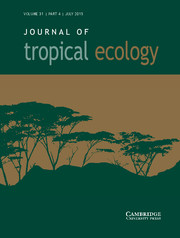Article contents
Diversity of ground-dwelling ants in sugarcane plantations under different management systems
Published online by Cambridge University Press: 25 March 2022
Abstract
In this study, we compared the richness of ground-dwelling ants among three different sugarcane management systems (with the application of the insecticide fipronil and the addition of vinasse; with fipronil and no vinasse; and with vinasse and no fipronil, i.e., an organic production system) to evaluate whether the feeding/foraging types vary according to the management system. We tested the hypothesis that organic management increases species diversity because there is no use of chemical inputs. Estimated species richness was significantly higher in the organic management system than in the systems that used fipronil with vinasse. Generalists species were prevalent in all sugarcane fields, regardless of the production system, whereas predatory and fungivorous species were infrequent. However, the organically managed field had many predatory species. Our results suggest that fipronil with vinasse in sugarcane cultivation alters the ant community, possibly disrupting the functions performed by the edaphic fauna, such as control of arthropod crop pests, due to reduced predator species richness.
- Type
- Research Article
- Information
- Copyright
- © The Author(s), 2022. Published by Cambridge University Press
References
Literature cited
- 1
- Cited by



